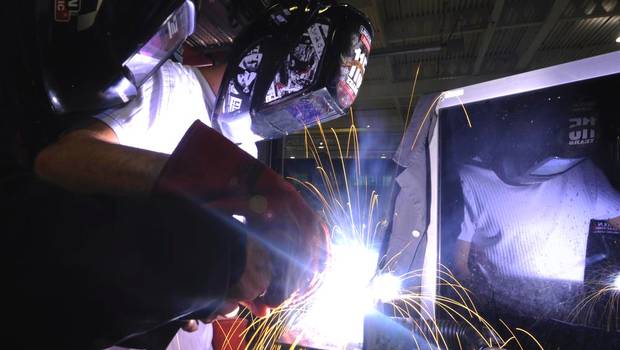
The Conservative government is preparing new budget measures to boost skilled trades in Canada, and one option under consideration would require companies to promise apprenticeship training as part of any bid for major procurement contracts.
Addressing Canada’s growing labour and skills shortage – along with balancing the budget by 2015 – is shaping up as a dominant theme of Finance Minister Jim Flaherty’s 2013 budget, which is expected within weeks.
Part of the government’s plan is to challenge the bias that exists among young Canadians who see a university degree as more valuable than going to college to learn a skilled trade.
To bridge that gap, Ottawa is said to be seriously considering the pre-budget proposals from Polytechnics Canada, a group representing 11 trades-focused colleges approved to offer bachelor degrees that are equivalent to a university degree.
The Polytechnics – which include six Ontario colleges, two institutes in Alberta and one each in British Columbia, Manitoba and Saskatchewan – have caught the eye of the Conservative cabinet for their willingness to involve the private sector in developing curriculum.
The government wants to encourage the private sector to offer more apprenticeships – which are currently in short supply. Policy options could include rewriting labour deals with the provinces so that apprenticeships are recognized across the country. Current labour agreements with the provinces – worth about $500-million a year combined – are set to expire in 2014 and their terms around skills training must be renegotiated. Another proposed option would be for Ottawa to offer a tax credit to employers who train apprentices.
Since September, Polytechnics Canada CEO Nobina Robinson or her representatives have met more than 30 times with government officials, including Conservative ministers and MPs, chiefs of staff to senior ministers and deputy and assistant deputy ministers in the public service.
The meetings have involved the Prime Minister’s Office, Finance, Human Resources and Skills Development and Industry Canada.
Human Resources Minister Diane Finley confirmed the government’s budget work is looking at recommendations from Polytechnics Canada. She also expressed personal support for tying government contracts to apprenticeships.
“Personally I think that’s a good idea at all levels of government. Whether that’s in the budget, you’ll have to ask Mr. Flaherty,” she said in an interview with The Globe and Mail.
The Globe reported this week that Canada faces a shortage of one million tradespeople by 2020, as many approach retirement. The average age of welders is 56, and many framers and finishers are also in their 50s.
Ms. Finley’s labour changes are facing fierce criticism in Atlantic Canada and Quebec, where protesters argue that her recent employment-insurance changes are targeting seasonal workers. Prime Minister Stephen Harper defended the changes Thursday during a stop in Rivière-du-Loup, Que., and said EI will continue to be available for seasonal workers.
Ms. Finley delivered a speech Thursday on skilled-trades shortages to a policy conference hosted by Canada 2020 at Ottawa’s Chateau Laurier. The minister said young students need to know they could be better off by learning a skilled trade.
“There would seem to be a bias among certain people, and we need to get past that,” she said.
The minister also said biases tied to specific jobs need to be overcome. “Miners don’t always have to be men. Software developers don’t always have to be young,” she said.
In an interview, Ms. Robinson, the head of Polytechnics Canada, said many of her organization’s proposals can be done without compromising Ottawa’s plan to erase the deficit.
“There are things that are actually fairly low-cost,” she said, pointing to the large number of infrastructure projects planned across the country. “Those are publicly tendered contracts. Why not say that the company that wins the contract actually must have registered apprenticeships?”
Originally published by The Globe and Mail. Article here.
